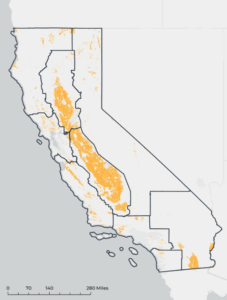Spotlight
Wolf & Associates has been privileged to be an instigator and steward, walking alongside the evolving organic community for many years. The modern organic movement was born during a key moment with a defiant spirit and a commitment to improving the world.
Read on as we share our thoughts about the direction of the organic community at this critical time.

Bill Wolf
CEO
Wolf & Associates

John Foster
COO
Wolf & Associates
Regulatory Updates
Seats Available on the National Organic Standards Board
USDA seeks nominations for National Organic Standards Board members. Five seats are available, and openings are for 2 farmers, 2 public interest representatives and a certifier. Board members serve 5 year terms, review materials for use in organic agriculture and products, and make recommendations to the National Organic Program. Nominations are due by September 9.
Our take: The work can be challenging, as the Board wrestles with thorny issues at times, but serving on the NOSB is a great opportunity to learn, demonstrate leadership, meet interesting people, and give back to the organic community. Our COO John Foster served on the board, and would be happy to share his insights with people considering NOSB service.
Compostable Product Requirements Extended in California
CalRecycle granted an extension to the requirement under California’s Compostable Product Standards Act for compostable packaging to meet agricultural input requirements of the National Organic Program (NOP). Beginning June 30, 2027, all compostable consumer products in California must be made of materials that are allowed under the USDA National Organic Program requirements. The extension applies to products that contain synthetic substances not allowed in organic agriculture but otherwise satisfy all requirements for lawfully being labeled “compostable.” Prior to the June 2027 deadline, CalRecycle will evaluate the situation. If there is a pending NOSB rulemaking recommendation to the NOP, the NOP has decided to initiate rulemaking but has not yet done so, or the rulemaking process is underway, CalRecycle will renew the extension, but not beyond January 1, 2031.
Our take: Even with a deadline extension, it’s vital to be proactive now about your compostable packaging and how changes in regulations may impact your business.
Inside the Beltway
How Will the Big Budget Bill Impact Food and Agriculture?
The National Sustainable Agriculture Coalition has done a deep dive in the provisions of the bill that was signed July 4, 2025. Here are some details. The bill:
- Slashes hundreds of billions from the Supplemental Nutrition Assistance Program (SNAP)
- Raises subsidies for commodity production, including a 10 to 20 percent increase to Price Loss Coverage program reference prices and a bump to revenue guarantees under the Agriculture Risk Coverage program, increasing payments to a small number of American farmers while leaving the vast majority of growers without updated help.
- Significantly alters existing payment limits and income tests, opening the gates to more taxpayer subsidies for millionaires and absentee landowners.
- Undermines Congress’s ability to pass a full, fair farm bill under normal order that would serve the full diversity of American agriculture and food systems.
There are a few bright spots where the bill:
- Reauthorizes and provides funding for some farm bill programs, including 1890 National Scholars Program, Organic Certification Cost Share Program, and the Organic Production and Market Data Initiative.
- Rescinds unobligated Inflation Reduction Act (IRA) funds for the Conservation Stewardship Program, the Environmental Quality Incentives Program, the Regional Conservation Partnership Program, and the Agricultural Conservation Easement Program, building them into the farm bill baseline. This move, however, shifts the emphasis away from popular practices that help farmers deal with the impacts of climate change, including increasingly unpredictable and disruptive weather events.
Our take: We will continue to advocate for organic farmers and the businesses that depend on them. That’s one reason we sponsor the Organic Trade Association’s Organic Week. Any chance we have to tell the story of organic agriculture and products in the halls of Congress can help create a more equitable food and farm policy that will better serve our communities.
Not-So-Sweet News About Sugar Imports
Beginning October 1, 2025, expect increased costs for organic sugar imports because the current administration will not extend the Specialty Sugar Quota limits to allow additional organic sugar imports beyond what is required by U.S. International obligations. The Organic Trade Association reports that tariffs will make up approximately 34% of the landed cost of organic sugar, up from just 4% last year, and 12% this year after the introduction of reciprocal tariffs.
Our take: Of the 88 organic sugar cane producers listed in the Organic Integrity Database, only 2 are in the United States. Developing even a portion of the volume this tariff will displace will take at least three years, provided there are people with the expertise, land and financing available to do it. Meanwhile, US consumers will be paying more for yet another household staple, and all the products that depend on it.
Organic Industry News & Notices
 Grower Group Certification Upheld
Grower Group Certification Upheld
On July 15, the United States Court of Appeals for the Ninth Circuit ruled in favor of preserving USDA’s organic “grower group” certification. The certification had been challenged by a hazelnut grower who claimed grower group certification damaged his business. Because he failed to demonstrate that damage in federal district court, the lower court determined in 2024 that he lacked standing, a decision affirmed on appeal. Grower group certification allows small and low-income farms worldwide access to the organic market, and is an important component of robust supply chains. More.
Our take: We celebrate this decision! Grower group certification has been part of NOP certification for years. Enabling farms of every size the opportunity to access organic markets is important for economic development and maintaining diversity of supply options, as well as reducing potentially harmful agricultural practices.
California Faces Challenges Meeting Organic Farm Targets
With a target of converting 10% of cropland to organic production by 2030, 15% by 2038, and 20% by 2045, California is facing some pressure to get it done as part of an overall effort to reach carbon neutrality. Certified organic acreage in the state has dropped from 2.2 million in 2020 to 1.8 million in 2022, about 7.4% of the state’s 24.2 million acres devoted to crops and livestock. Farmers cite reduced organic premiums as one of the reasons for the shift away from organic.
Our take: Matching farms with top-notch organic market intelligence, as is available for conventional agriculture through multiple government programs, is a key to helping farm businesses thrive in the organic sector. We continue to advocate for improved data on the organic sector, including more import export codes for organic products and organic-specific product forecasts.
New Project Brings Market Info to Organic Farmers
As part of a recent Transition to Organic Partnership Program webinar on “Growing Market Pathways: Connecting Farmers and Handlers to Organic Opportunity” our Associate Joe Dickson introduced The Farmer’s Toolkit, a new project underway in conjunction with the Rodale Institute. Designed to connect organic farmers with regionally appropriate market opportunities, the project aims to strengthen regional supply chains.
Our take: Organic farmers deserve actionable market intelligence on par with what’s offered to conventional agriculture. The Toolkit aims to help bridge that gap.
The Survey Says…
Do Consumers Trust Sustainability Claims?
According to Hartman Group reports, trust in sustainability claims fell slightly between 2021 and 2023. Consumers who report usually believing claims dropped 3 points to 17% in 2023, about the same number who don’t usually believe the claims (16%). About 38% are skeptical of sustainability claims—up 2 points from 2021—while 22% says it depends on the company making the claim.
Our take: The Hartman Group’s 2025 report will be available in September—we’ll see if the downward trend continues.
Taking a Count
Strengthening Organic Enforcement One Year On
3378: US organic handlers certified January. 1, 2024 to March 21, 2025
7105: International organic handlers certified January. 1, 2024 to March 21, 2025
177,715: National Organic Program electronic import certificates March 19, 2024-February 28, 2025
104,337: Certificates in Customs and Border Patrol-Automated Commercial Environment (ACE)
75: Percent NOP import certificates that match data in CBP-ACE (Spring 2024)
95: Percent NOP import certificates match data in CBP-ACE (June 2025)
Source: Lori Tortora, Director of Compliance and Enforcement, National Organic Program during “SOE One Year On: Successes, Challenges, and Organic Opportunities” Organic Trade Association webinar, June 18, 2025
Organic Community
 Meet Our Team
Meet Our Team
TARA CROSS brings over 20 years of sales, marketing, and operational leadership to the Wolf & Associates team, with deep roots in the food and beverage space. She served as National Marketing Director for Allegro Coffee, a Whole Foods Market subsidiary, where she helped bring hundreds of products to life—collaborating with producers around the world to develop unique, values-driven offerings that resonated with retail buyers and customers alike. She brings an instinct for both the big picture and the daily details that drive results.
Today, she channels this experience into helping Wolf & Associates and clients craft compelling narratives, fine-tune their go-to-market strategies, and build momentum in a fast-moving marketplace.
- Based in Golden, CO and Taos, NM
- Founder of TCross Branding + Consulting
Ask her about launching new items into Whole Foods Market, building brands from the ground up, or her favorite Taos farmers market find.
PCO Appoints New Executive Director
Congratulations to Chris Solt, the new Executive Director of Pennsylvania Certified Organic. Chris has more than 20 years of leadership experience in the fair trade, cooperative, and sustainable agriculture sectors, most recently serving as Executive Director of the Fair Trade Federation. Chris will officially join the PCO team in late September.
Our take: We’ve provided interim management for PCO, and are thrilled that the organization has found such capable and dedicated leadership to guide the PCO team.
 OneCert Founder Passes On
OneCert Founder Passes On
Samuel Welsch, founder of the OneCert organic certification service, passed away July 17 in Lincoln, Nebraska. His intelligence, clarity of thought and dedication to what he felt was right will be missed in the organic community and beyond.
Call for Proposals for Climate Day
The Climate Collaborative seeks proposals for its Climate Day activities March 3 at Natural Products Expo West. Send your ideas for keynotes, panels, roundtables, case studies, or other sessions by August 29.

